Column: Are climate protesters changing the world? Or wasting their time?

Sometimes itâs clear when youâre watching history: the March on Washington. The Apollo 11 moon landing. Vice President Kamala Harris becoming the first woman of color to accept a major party presidential nomination.
Other times, it can be years or decades before the arc of history reveals itself.
You're reading Boiling Point
Sammy Roth gets you up to speed on climate change, energy and the environment. Sign up to get it in your inbox twice a week.
You may occasionally receive promotional content from the Los Angeles Times.
As I watched more than a dozen young climate activists march down a Brentwood street toward Harrisâ home on Monday, I wondered: Am I seeing history get made? Or will this protest â in which Sunrise Movement supporters urged Harris to release a climate plan and stop promoting oil and gas drilling â ultimately amount to nothing?
I had the same questions Sunday, when I arrived at Dodger Stadium to watch a dozen-plus climate advocates â these folks skewing older â rally outside the ballpark before an afternoon game against the Colorado Rockies.
They urged Dodgers owner Mark Walter to end an advertising partnership with oil giant Phillips 66, trumpeting a petition with 20,000 signatures that calls for the team to âstop giving cover to producers of climate chaos.â
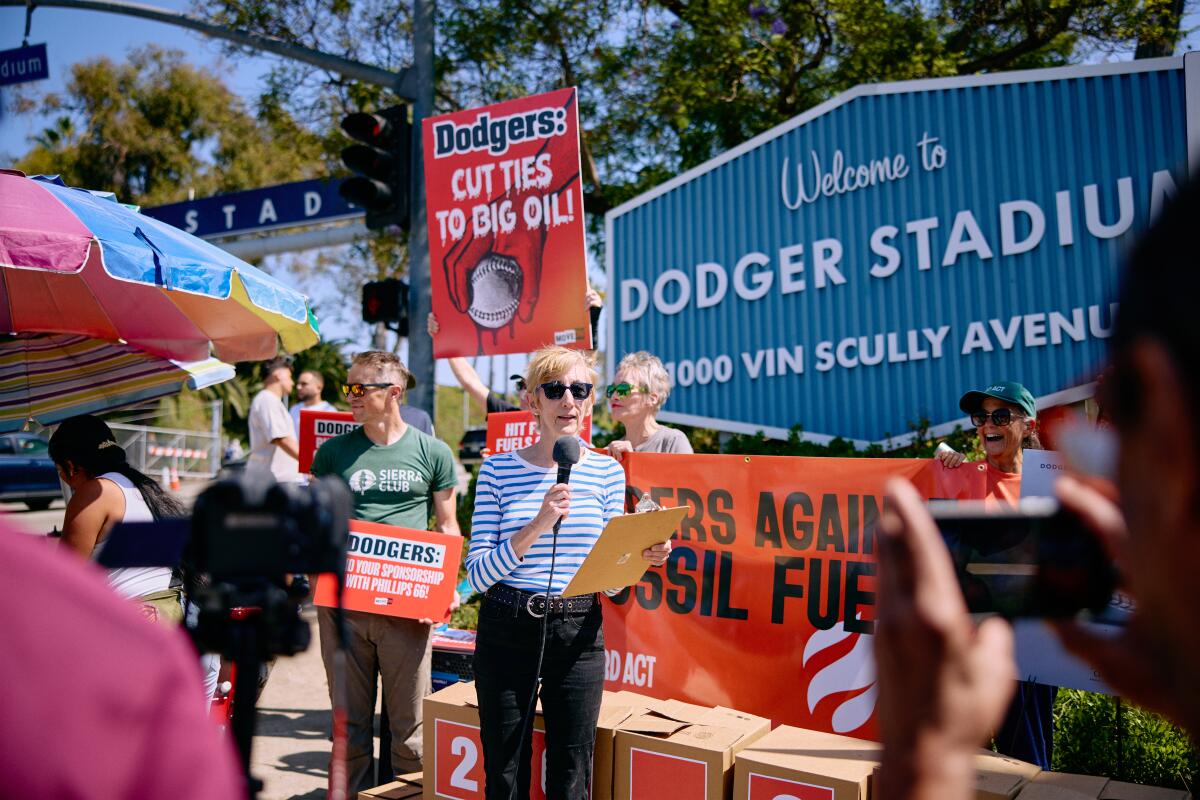
Were these small groups of activists going to change the world? Or were they wasting their time?
The day before the Dodger Stadium rally, another activist took a bold stand.
This time it was Ben Jealous, executive director of the Sierra Club and former president of the NAACP, the nationâs largest civil rights group. It involved a banquet held Saturday by the NAACPâs Monterey County Branch.
Two days before the event, Jealous wrote to the chapterâs leaders. Although he was thrilled, he said, to be invited to speak â he grew up in Californiaâs Monterey County and was trained as an organizer by the NAACP chapter â he was âheartbroken ... to have that invitation revoked in order to protect the comfort of the eventâs sponsor.â
The sponsor being oil industry behemoth Chevron.
âWhen I received a request from the Branch to censor my remarks and not âvoice a point of view that might make Chevron uncomfortable,â that was one request I had to refuse,â Jealous wrote in his letter.
Jealous pointed to extensive research showing that Black families and other people of color are especially likely to breathe air polluted by oil and gas facilities, and to be harmed by extreme weather disasters for which oil and gas emissions bear a growing share of the blame. He noted that Chevron and other fossil fuel companies successfully sued Monterey County to overturn Measure Z, a voter-approved ban on new oil and gas wells.
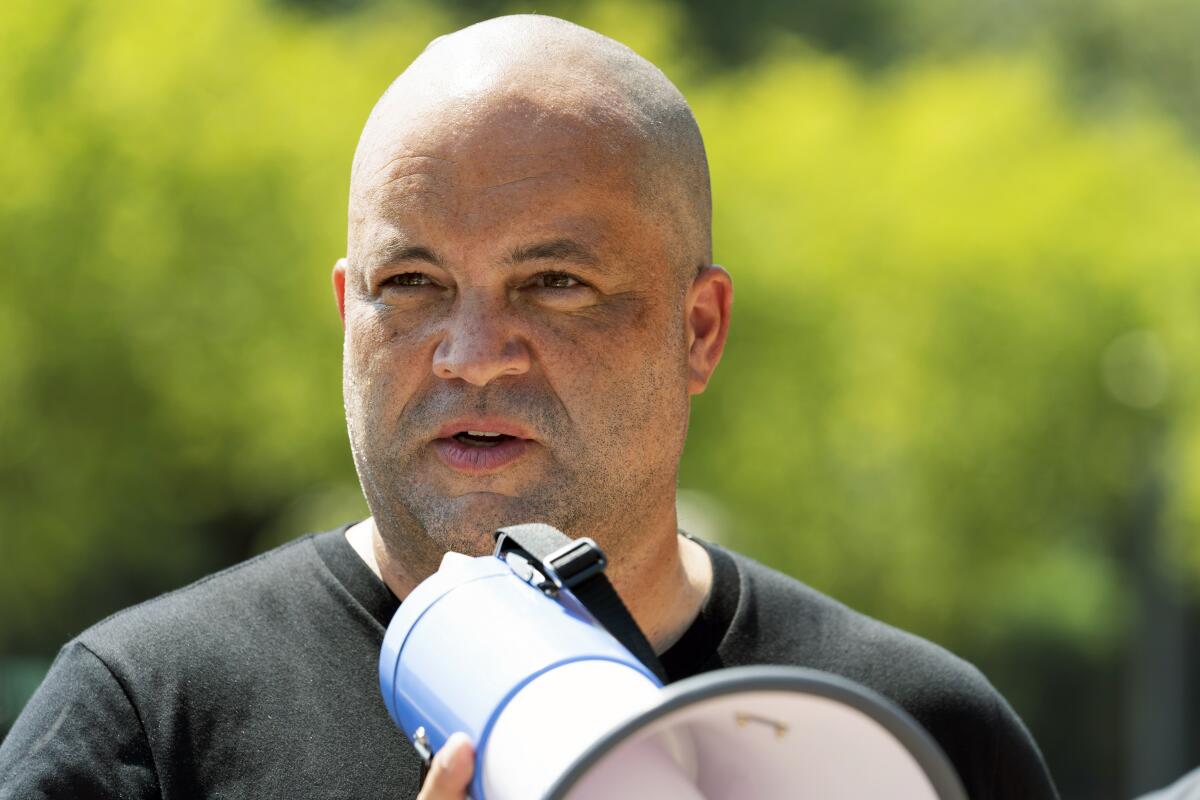
Jealous also highlighted reporting showing that NAACP chapters getting oil and gas money have at times fought against clean energy. He called the donations âblood money,â comparing them to Big Tobacco donations.
âThe Monterey County Branch should return Chevronâs check immediately,â Jealous wrote.
The group did not accede to his demand.
In a written statement, the Monterey County Branch took issue with Jealousâ version of events.
The chapter said that although it âdid indeed attempt to connect withâ the Sierra Club executive director for last yearâs banquet, it âDID NOT extend an invitationâ this year. The decision was made âafter thorough consideration of logistical constraints and the importance of aligning our event with available speakers,â the group said.
As for Chevron, the group said the oil company has been âproud to support the Monterey County NAACP for the past four years,â sponsoring the banquet three times. The partnership âis rooted in a genuine desire to uplift and empower communities, and there has never been an ulterior motive behind their financial contributions.â
âMr. Jealousâ call to reject Chevronâs sponsorship outright does not fully encompass the nuanced considerations our organization faces,â the NAACP chapter said. âOur commitment remains to positively impact our community, and we are mindful of the various factors at play in this partnership. We are taking all feedback seriously.â
A Chevron spokesperson offered a similarly cheery story, telling me the firmâs âpartnerships and investments in youth, health, education and economic development help advance progress and strengthen communities.â
âWe work together with our community stakeholders to understand their needs,â he said in an email.
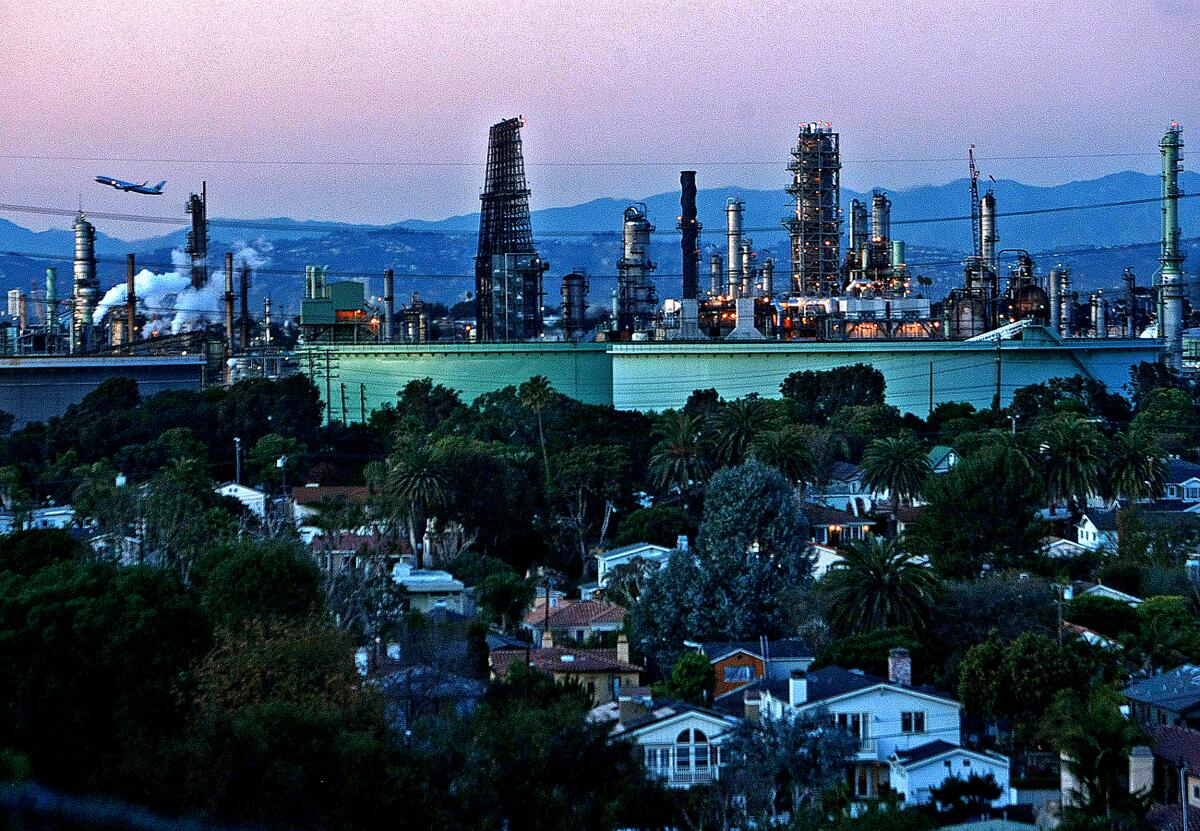
I doubt Chevronâs motives are anything other than profit-driven. But at least the company bothered to comment. Phillips 66 declined my offer to weigh in on Sundayâs rally at Dodger Stadium. Same goes for the Dodgers.
The speakers at Sundayâs rally discussed similar themes as Jealous did.
The most powerful voice belonged to Alicia Rivera, an organizer with Communities for a Better Environment. She noted that five oil refineries are clustered in L.A. Countyâs South Bay, and that one of the highly polluting facilities is owned by Phillips 66, whose 76 gasoline station brand is Dodger Stadiumâs most prominent advertiser.
Rivera talked about daily life in Wilmington, where high cancer and asthma rates are par for the course. She said families will often stay inside and shut their windows even when itâs hot outside, âto stop from smelling the fumes coming from the refineries.â She described parents dealing with anxiety âbecause they donât know when they are going to have to take their child [to the emergency room] after midnight because they canât breath.â
âPhillips 66 has found itâs profitable and great to join and promote sport,â Rivera said. âWe need to stop that.â
As far as Iâve been able to figure out, this was the first protest of a U.S. sports team over a fossil fuel sponsor â not that this probably means much to most fans. The vast majority of people driving past the activists seemed to ignore them. A few people walking past were annoyed at having to step off the sidewalk to get around them.
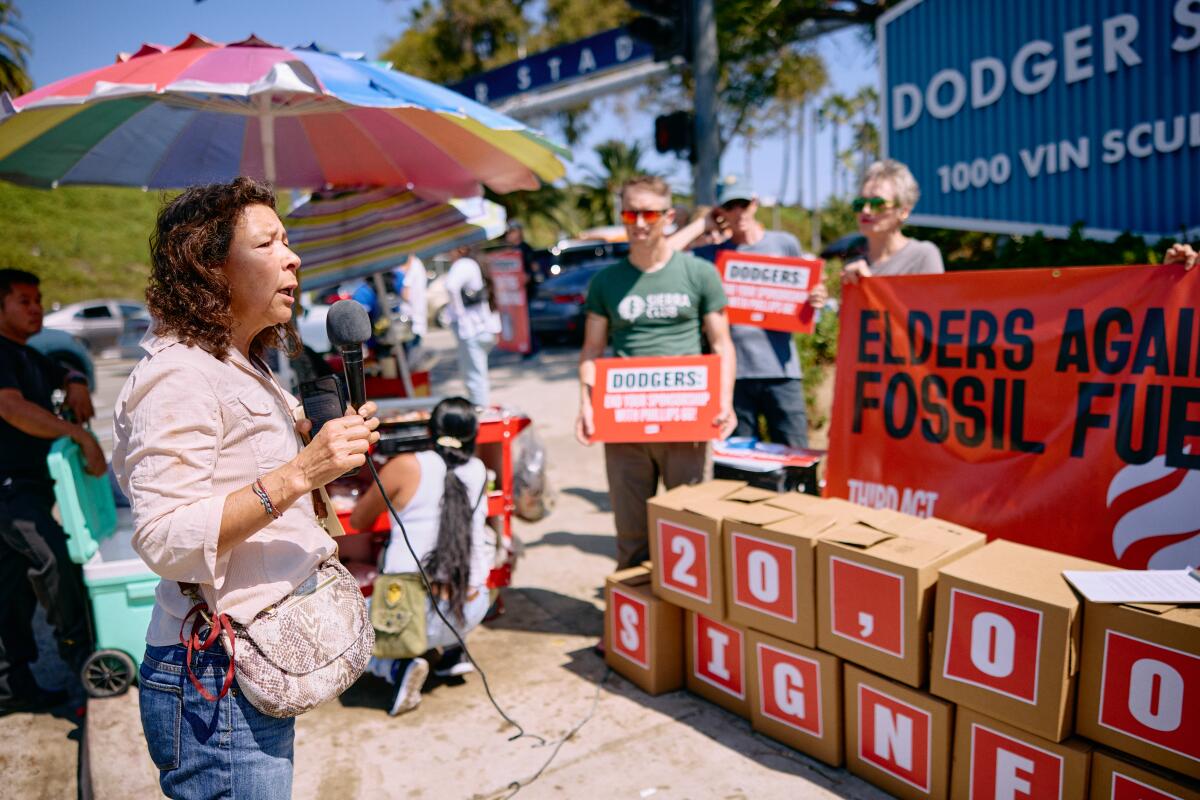
Does that mean the protest was a failure? Were the activists playing a losing game?
I donât know â if the Dodgers will drop Phillips 66 as a sponsor, or if Harris will stop talking up oil and gas drilling, or if the NAACPâs Monterey County Branch will start refusing donations from Chevron.
But the March on Washington didnât materialize out of nowhere. Only a full century after the abolition of slavery did the civil rights movement begin yielding high-impact laws such as the Voting Rights Act. Even the Greensboro sit-ins â which started when four Black college students refused to leave a segregated lunch counter â built on the heroic work of activists whose actions didnât produce all of their desired results, at least not right away.
Thereâs a reason people love to quote anthropologist Margaret Meadâs admonishment: âNever doubt that a small group of thoughtful, committed citizens can change the world; indeed, itâs the only thing that ever has.â
So maybe I watched a tiny inflection point in the arc of the moral universe this week. Maybe not.
But I knew I had to watch, and write down what happened. Because thereâs no history without a story.
On that note, hereâs what else is happening around the West:
CLIMATE CALAMITY
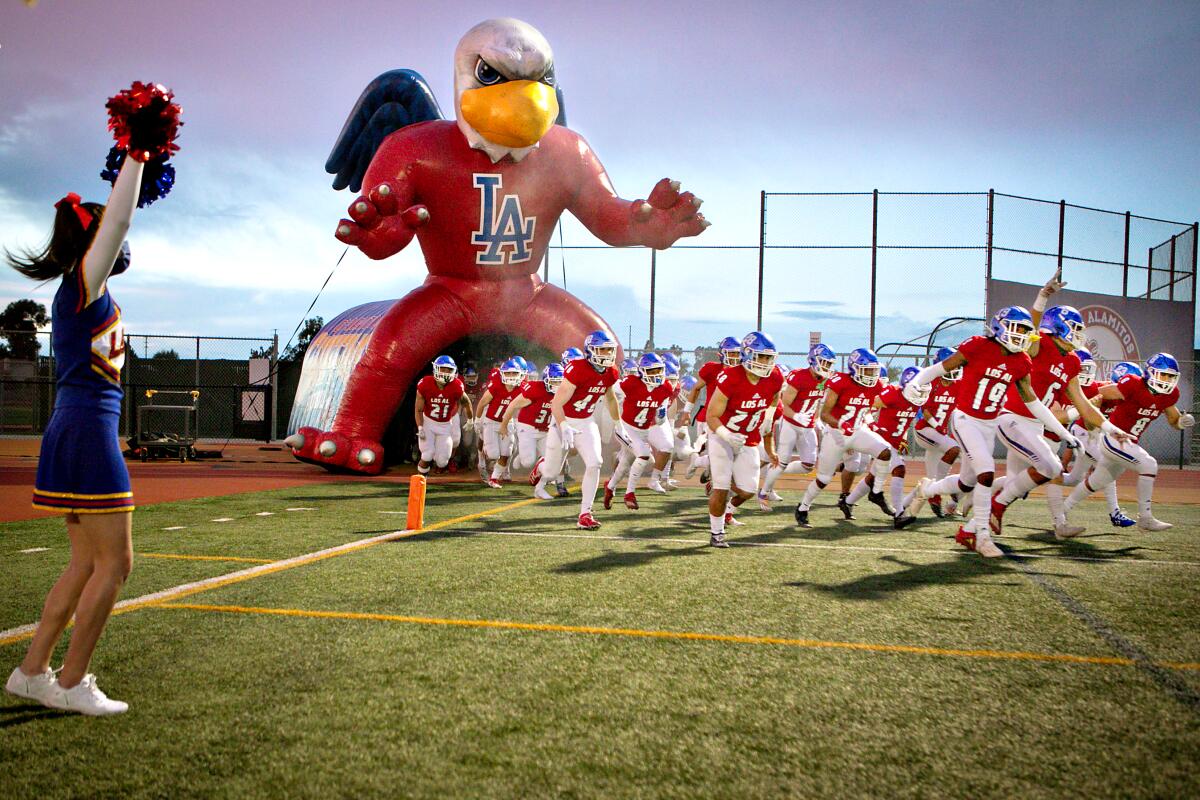
Sports arenât just a venue for oil industry greenwashing. Theyâre also threatened by fossil fuel combustion.
The Associated Pressâ Michael Casey reports that at least five U.S. high school football players have died since July from suspected heat-related illness â and that the risks are only getting worse with rising temperatures. Under a new law, California schools are required to move practice indoors when temperatures reach certain levels, among other steps to keep student athletes safe from extreme heat. Details here from CalMattersâ Deborah Brennan.
Wildfires, meanwhile, are chewing up landscapes and homes â in Southern California and the Pacific Northwest, which has set a modern record for acres burned this year, per Zach Urness at the Sales Statesman Journal.
Californiaâs attorney general, Rob Bonta, is responding to the crisis by confronting its perpetrators. Having already sued major oil companies for an alleged âdecades-long campaign of deceptionâ about climate, Bonta just filed another suit against Exxon Mobil, The Timesâ Tony Briscoe and Susanne Rust report. This time, heâs accusing Exxon of misleading the public about the recyclability of plastic, to fuel demand for the petroleum-based product.
Will Bontaâs strategy work? Hard to say.
If youâre looking for good news, Californiaâs heat-trapping emissions fell by 2.4% in 2022, new data show, per this story by Tony Briscoe. On the other hand, powerful planet-warming methane emissions are rising nationally â a result of booming fossil fuel extraction, the New York Timesâ Max Bearak reports. Thatâs one reason many climate activists are so frustrated when they hear Vice President Kamala Harris boast about record gas production.
THE ENERGY TRANSITION
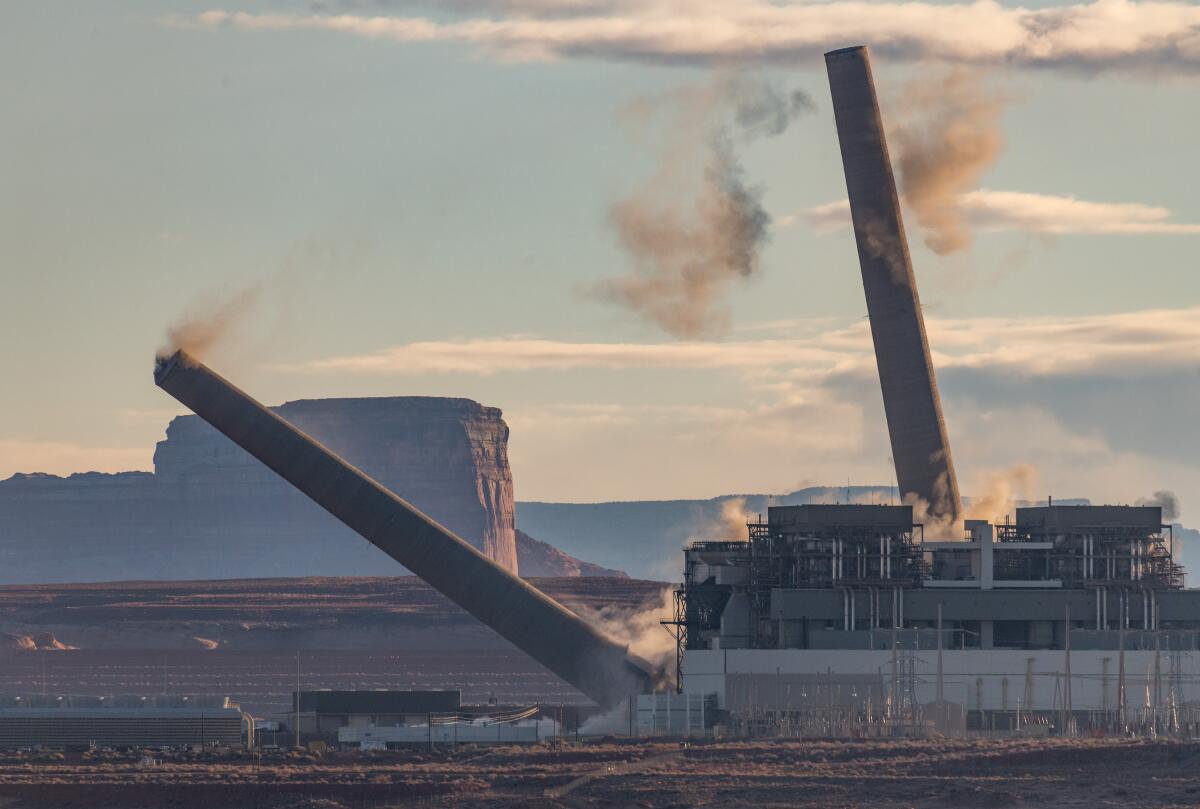
Thereâs a reason politicians and activists spend a lot more time arguing about oil and gas than about coal these days. Thatâs because coal continues its long decline â with help from the Biden administration.
The latest blow to the dirtiest fossil fuel is a federal plan to give $7.3 billion in climate and clean energy funding from President Bidenâs Inflation Reduction Act to rural electric co-ops. A big chunk of the money will help Western co-ops shut down coal plants ahead of schedule, Canary Mediaâs Jeff St. John reports. In Arizona, that will mean a lot of new solar farms and batteries â but also some gas plants, per the Arizona Republicâs Austin Corona.
In Wyoming, meanwhile, the federal Environmental Protection Agency has told state officials they must do more to reduce pollution from local coal plants, to clean up the air in and around national parks. There will no doubt be lawsuits, as Jake Bolster reports for Inside Climate News. Many Wyoming politicians still love coal.
For a comprehensive roundup of the Westâs remaining coal plants, see my story from earlier this year.
As usual, here are some stories about the challenges and opportunities of the clean energy transition:
- Federal officials promised the Yakama Nation $32 million to put solar panels over canals. But the money may never come through, due to bureaucratic delays. (Story by Tony Schick, Oregon Public Broadcasting)
- An Indigenous tribe is suing the feds over plans for offshore wind energy in Oregon. (Associated Press)
- Federal officials are negotiating with NextEra Energy to build a solar and battery storage project surrounding the nationâs only nuclear waste storage repository, in New Mexico. (Susan Montoya Bryan, Associated Press)
In California, state officials continue to push electrification â replacing oil-fueled cars and gas appliances with electric alternatives. Again, there have been successes and setbacks. Some recent examples:
- The stateâs new building code will encourage commercial buildings â but not residential homeowners â to replace broken air-conditioning systems with electric heat pumps. (Alison F. Takemura, Canary Media)
- Thereâs a years-long wait to connect electric truck charging stations to the grid. (Jeff St. John, Canary Media)
- The California Public Utilities Commission recently approved Pacific Gas & Electricâs fourth rate increase this year. The pricier electricity gets, the less people will want to use electricity. (Ari Plachta, Sacramento Bee)
Fossil fuel companies have promoted alternative fuels as a climate solution. Many activists arenât so sure:
- Oregonâs largest gas utility pitched ârenewable natural gasâ to stave off electrification. Seven years later, the fuel has done almost nothing to help the climate, a new investigation finds. (McKenzie Funk, ProPublica)
- Environmentalists sued the Port of Stockton over a fossil hydrogen project. (Ari Plachta, Sacramento Bee)
ONE MORE THING

If youâre reading this early Thursday, live in or near Los Angeles and donât have other plans this morning, feel free to come downtown to hang out with me and my L.A. Times colleagues! Starting at 8:15 a.m, weâre hosting Climate California Live, a series of discussions about climate anxiety, activism and sustainable lifestyles.
You can buy a ticket here, or in person at the Colburn School. Hope to see you there.
This is the latest edition of Boiling Point, a newsletter about climate change and the environment in the American West. Sign up here to get in your inbox. Or open the newsletter in your web browser here.
For more climate and environment news, follow @Sammy_Roth on X.
Toward a more sustainable California
Get Boiling Point, our newsletter exploring climate change, energy and the environment, and become part of the conversation â and the solution.
You may occasionally receive promotional content from the Los Angeles Times.




